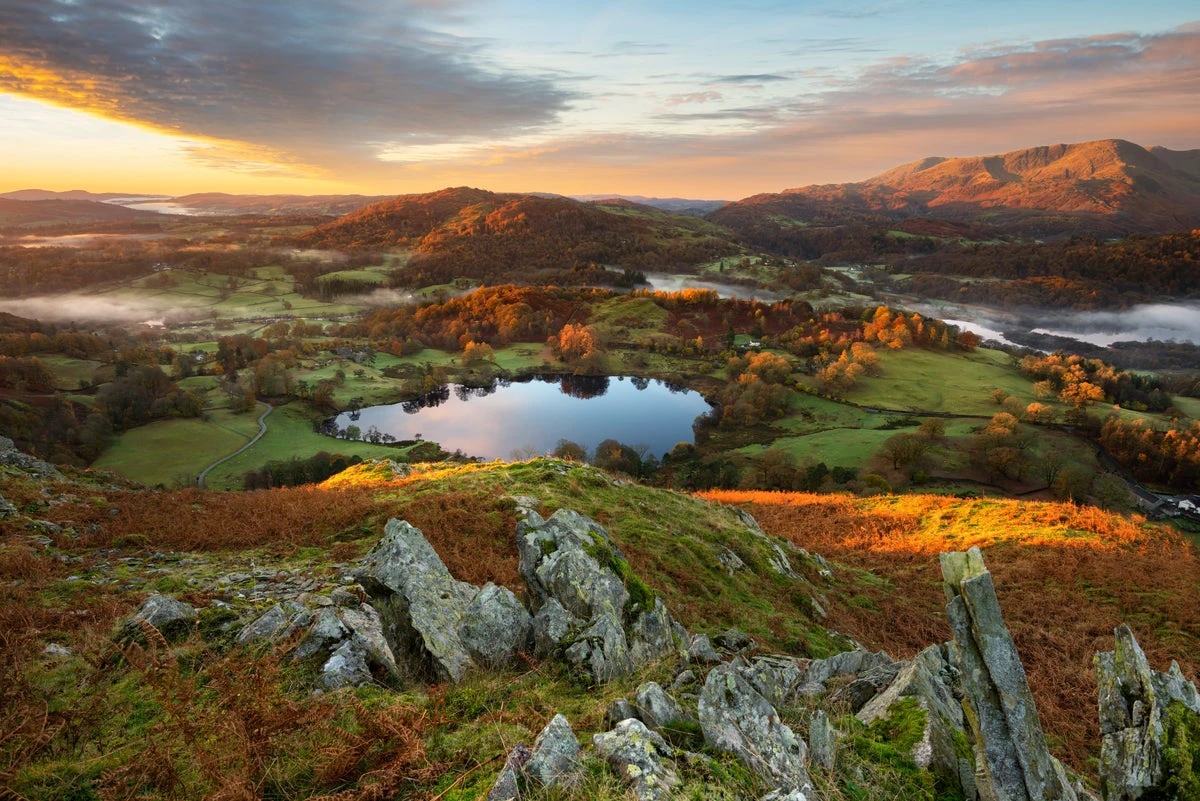The rain rolled over me like a wave as the wind unleashed another whip.
Elba, my labrador, peered down at me – ears flapping, tongue lolling – before loping out of view.
Looking around for the first time in a while, I noticed vibrant green ferns carpeting the valley, the flow only interrupted by Greenhead Gill’s snaking trail. Surrendering to the elements, I opened both arms wide to catch thick droplets of rain on my face.
I was in the Lake District to walk the 21-mile Wordsworth Way, named after the Romantic poet who made the national park his home. There’s a more leisurely 14-mile route, but I attempted the longer stretch, using public transport links at either end.
Making the Wordsworth Way – which opened in April – accessible by public transport was a top priority for one of the groups behind the project, Friends of the Ullswater Way.
“It’s part of a concerted effort to create an environmental network of routes,” said group trustee, Tim Clarke.
“The wider mission is to allow people to visit the area and enjoy its beauty and tranquillity without polluting the environment.”
It’s an easy hop on the hourly 508 Stagecoach service from Penrith train station to the route’s start in Glenridding.
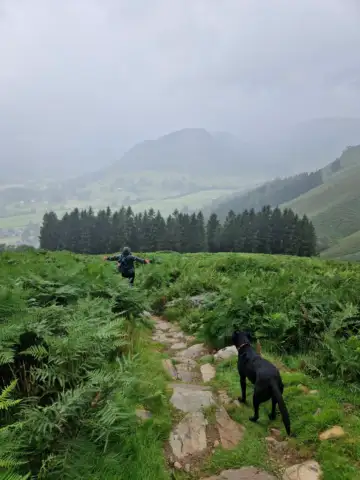 Despite the drizzly and windswept day, I headed to the upper deck of the open-top bus, and I was not alone. As we skimmed the shores of Ullswater, walkers in the surrounding seats pored over maps and planned their routes.
Despite the drizzly and windswept day, I headed to the upper deck of the open-top bus, and I was not alone. As we skimmed the shores of Ullswater, walkers in the surrounding seats pored over maps and planned their routes.
The first stretch of the walk, from Ullswater to Grasmere, is eight miles long. It’s the site of Wordsworth’s early life and natural education, crossing energetic fell paths, ancient woods and rolling farmland.
From Glenridding pier, on Ullswater, I gazed over glassy water to the stony faces of the fells, mist curling around their peaks.
Wordsworth was deeply affected by the looming mountains here. Looking at the same view, I felt awestruck in the presence of the same giants.
To navigate, I was using a combination of GPX files from the route’s website and the official guidebook.
Writer of the guide and University of Cumbria alumnus, Jade Cookson, has said that “the spirit of the Wordsworth Way is to slow down, read the landscape, and see it through poetry as well as your own eyes.”
As such, there are poems and extracts in the guide alongside traditional directions, encouraging ramblers to notice the small details.
Threading together pre-existing paths, the route unfolds in four stages, each tied to a different chapter of Wordsworth’s life. But there is a cast of characters at the heart of this walk.
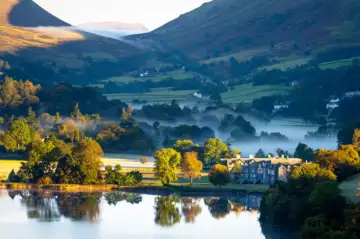 As Cookson explains, “I wanted to move away from presenting Wordsworth as a solitary genius wandering alone, and instead show the network of family and friends who shaped his work.”
As Cookson explains, “I wanted to move away from presenting Wordsworth as a solitary genius wandering alone, and instead show the network of family and friends who shaped his work.”
Writings and journal entries from William’s sister, Dorothy Wordsworth, and fellow poet and collaborator Samuel Taylor Coleridge, are woven throughout the narrative.
Continuing past Jenkins Field, a wildflower meadow with golden grasses and buttercups that tower on stilt-like stems, the route plunges into the heart of Grisedale valley.
I traced a dry stone wall in the company of ancient trees, the river thundering beneath my feet. At the basin of the Helvellyn range, the track reaches wilder territory, and the dramatic fell scenery here is some of the best of the entire route.
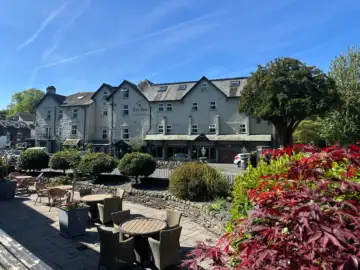 I picked past scree and boulders, pausing for a poignant moment at The Brother’s Parting Stone, a landmark of the farewell point between William, Dorothy and their brother John, who died at sea in 1805.
I picked past scree and boulders, pausing for a poignant moment at The Brother’s Parting Stone, a landmark of the farewell point between William, Dorothy and their brother John, who died at sea in 1805.
After a day in the fells, a friendly welcome awaited Elba and me at The Inn at Grasmere, a traditional country hotel ideal for exploring the village on foot. Here, you can sup real ales on tap from breweries in nearby Hawkshead and Appleby, and tuck into hearty pub fare like steak and ale pie.
While here, it’s worth calling at Wordsworth’s former homes: Dove Cottage and Allan Bank. In my room later, I looked over the scramble of slate roofs and studied the rocky faces of Silver How and Lang How fells, the ridge line curving out of view.
The second walk comprises a heart-pumping climb to Alcock Tarn, contrasted by an afternoon’s amble along the stony Coffin Route to Rydal. This was one of several ancient pathways used in late medieval times to transport the dead to churches with burial rights.
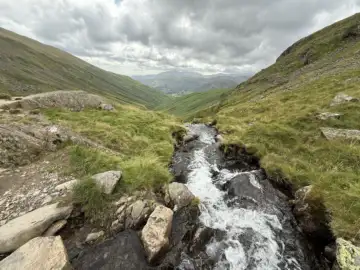 I enjoyed panoramic views over Rydal Water, with Loughrigg Fell and Rydal Cave framed in the background. With an emphasis on family connections, walk three passes another of Wordsworth’s former homes, Rydal Mount, and the daffodil field dedicated to his daughter Dora, who died in 1847.
I enjoyed panoramic views over Rydal Water, with Loughrigg Fell and Rydal Cave framed in the background. With an emphasis on family connections, walk three passes another of Wordsworth’s former homes, Rydal Mount, and the daffodil field dedicated to his daughter Dora, who died in 1847.
The following morning, beneath a sweeping hoard of cackling crows, I made a beeline for Sarah Nelson’s Gingerbread shop, a former schoolhouse that Wordsworth’s children attended between 1811 and 1813.
In a queue snaking around the neighbouring St Oswald’s churchyard, I welcomed wafts of buttery caramel and spiced ginger. Biscuits in hand, I wandered amongst the yew trees, eight of which are said to have been planted by Wordsworth himself.
The poet and his family are buried here, so I took a moment at their weather-beaten graves, along with a steady stream of visitors.
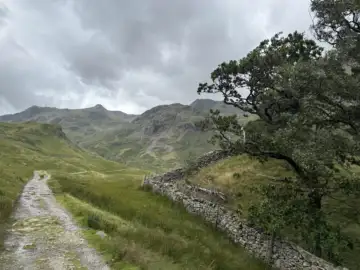 The fourth and final stretch follows a paved country road beside the River Rothay. Along the way, the route explores the homes and lives of literary figures connected to Wordsworth, such as Thomas De Quincey and Harriet Martineau, before ending at the market town of Ambleside.
The fourth and final stretch follows a paved country road beside the River Rothay. Along the way, the route explores the homes and lives of literary figures connected to Wordsworth, such as Thomas De Quincey and Harriet Martineau, before ending at the market town of Ambleside.
From here, Stagecoach services 555 and 599 connect to Windermere train station. While Wordsworth famously opposed the introduction of the Kendal and Windermere railway in the 1840s, today he might have welcomed this more thoughtful way of connecting with the land he loved.
How to do it
Rebecca’s trip was supported by Stagecoach. Buses run hourly (every two hours outside public and school holidays) from Penrith train station to the route’s start in Glenridding. A North West Explorer ticket costs £12.
Download the Stagecoach app to buy in advance. Catch a train to the Oxenholme or Windermere from most major UK cities including Manchester, London and Edinburgh.
Visit the Friends of Ullswater Way website for more details about the route.
Where to stay
Rebecca was a guest of The Inn at Grasmere. Bed and breakfast rooms start at £130 per night (dinner packages also available.
